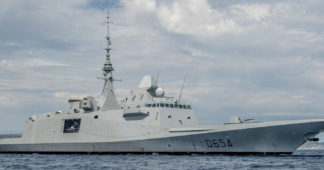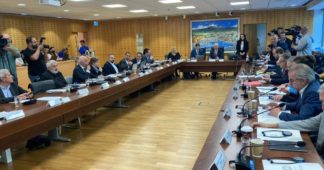Sep 12, 2024
“the electrical interconnection with Greece and Cyprus is top priority,” Israel’s Energy and Infrastructure Minister, Eli Cohen, said on Thursday, a day after Cyprus signaled that the GSI with Greece was in limbo.
On a post on X, Cohen wrote that he spoke with his Cypriot counterpart on the “Great Sea Interconnection” (GSI) project on Thursday.
I spoke with the Minister of Energy, Trade, and Industry of Cyprus, Mr. George Papanastasiou.
We underscored the strong relationship and ongoing cooperation between Israel and Cyprus, and I emphasized the great importance of the “Great Sea Interconnector” project to Israel. The… pic.twitter.com/ZHtOVV3k56
— אלי כהן | Eli Cohen (@elicoh1) September 12, 2024
“I spoke with the Minister of Energy, Trade, and Industry of Cyprus, George Papanastasiou. We underscored the strong relationship and ongoing cooperation between Israel and Cyprus, and I emphasized the great importance of the ‘Great Sea Interconnector’ project to Israel. The project will connect Israel’s electricity grid to the European one through Cyprus and Greece, and strengthen energy security in the region,” he noted.
“This groundbreaking project is a top priority for Israel as it enhances regional energy security, provides access to diverse energy markets, and strengthens Israel’s integration into the European energy network,” he added.

Cyprus has yet to decide whether it will remain the last energy-isolated country in the EU or gain access to the European electricity market through Greece.
The meeting held yesterday in Nicosia, convened by the President of Cyprus, Nikos Christodoulides, did not lead to a definitive agreement on the implementation of the Great Sea Interconnector (GSI) project. This project involves laying a cable to connect Cyprus with Crete and Cyprus with Israel, which is currently focused on its war with Hamas.
After the meeting, which included the Greek and Cypriot Energy Ministers, Theodoros Skylakakis and Giorgos Papanastasiou, along with the CEO of the Independent Power Transmission Operator (IPTO), Manousos Manousakis, the atmosphere reportedly did not suggest optimism for overcoming the obstacles threatening to derail a project with significant geopolitical implications.
Theodoros Skylakakis stated that the meeting was constructive and that work would continue. He avoided answering questions on the substantive issues discussed, saying, “What we’ve said is enough for today.” When asked if he was optimistic that a solution could be found, Skylakakis repeated that he had nothing to add, only stating that negotiations would continue on both technical and “obviously, also on a political level.”
Cypriot Energy Minister Giorgos Papanastasiou was also vague, saying, “It is a task that needs to continue, and it will continue.” When asked if the parties were closer or further from an agreement, Papanastasiou said he couldn’t comment further, noting that the Greek Energy Minister and the rest of the delegation had to depart. He denied that Greece had set ultimatums, emphasizing that he could not reveal what had been discussed during the meeting. He reiterated, “It was a constructive discussion. The parties understand each other’s positions, and this work must continue until it concludes.”
Surprise Exit by President Christodoulides
A notable moment was the exit of Cyprus President Nikos Christodoulides from the meeting before it had concluded, as he attended a book presentation event. He was briefed afterward and stated that holding the discussion about the Cyprus-Greece electrical interconnection was a very good decision, as “it helped clarify many issues that were ambiguous and unclear,” and discussions would continue.
We remind our readers that publication of articles on our site does not mean that we agree with what is written. Our policy is to publish anything which we consider of interest, so as to assist our readers in forming their opinions. Sometimes we even publish articles with which we totally disagree, since we believe it is important for our readers to be informed on as wide a spectrum of views as possible.











